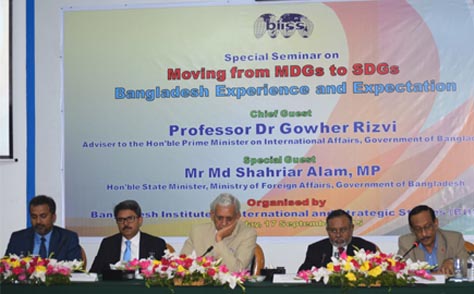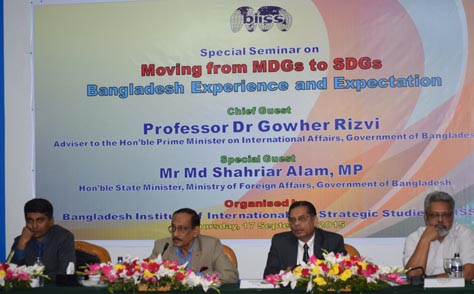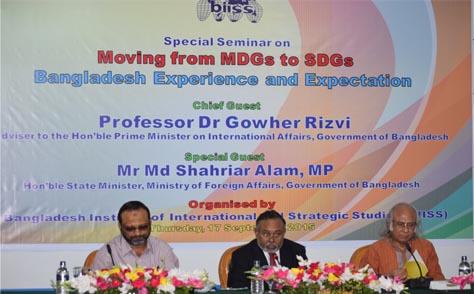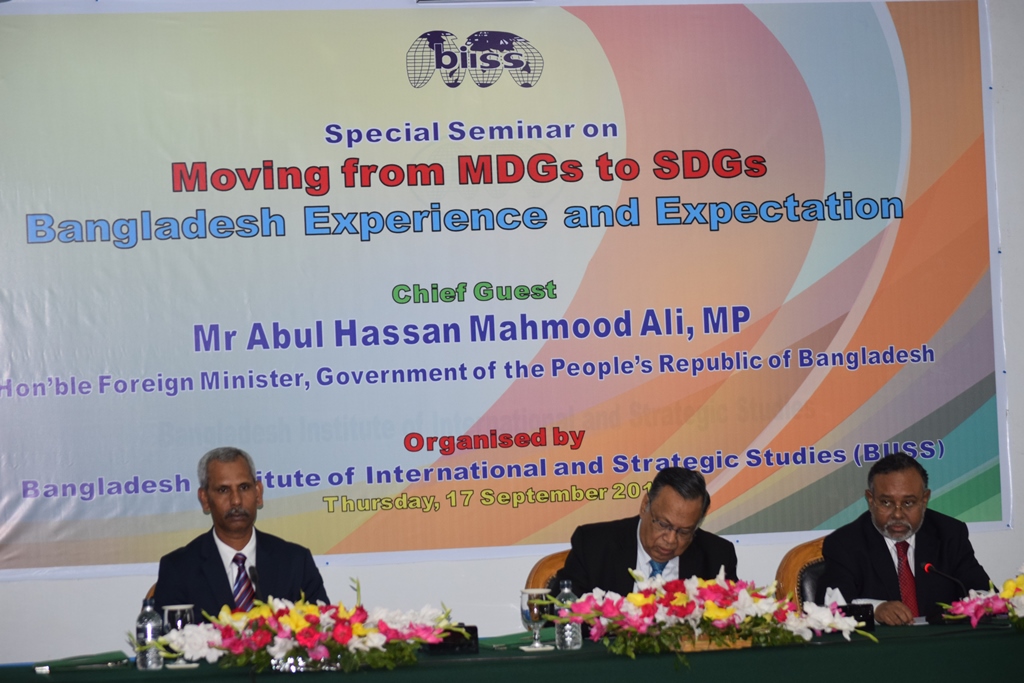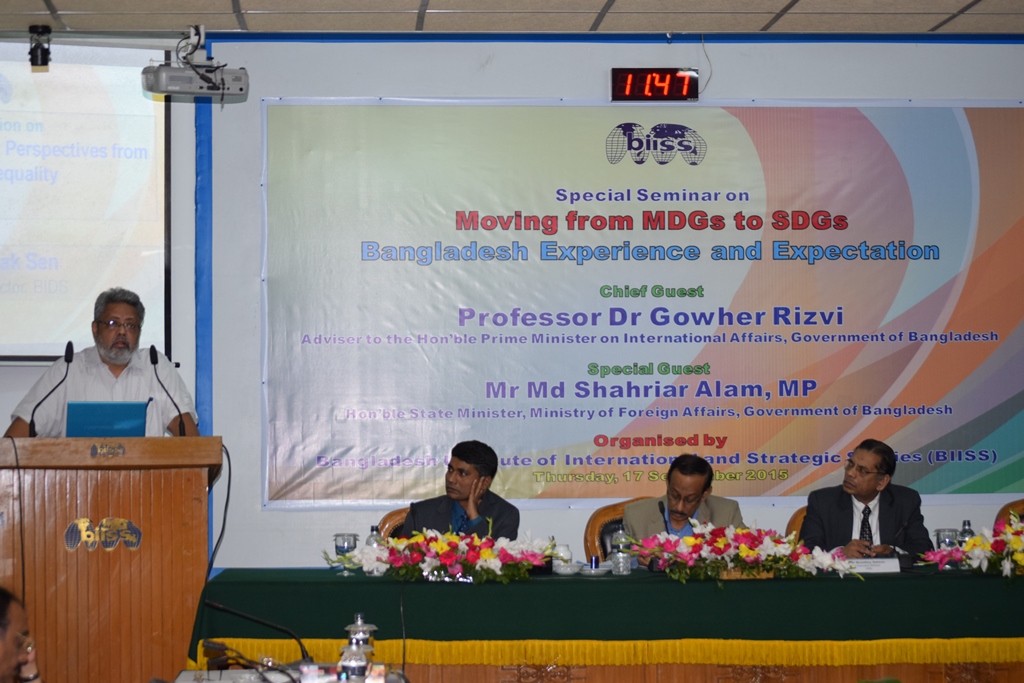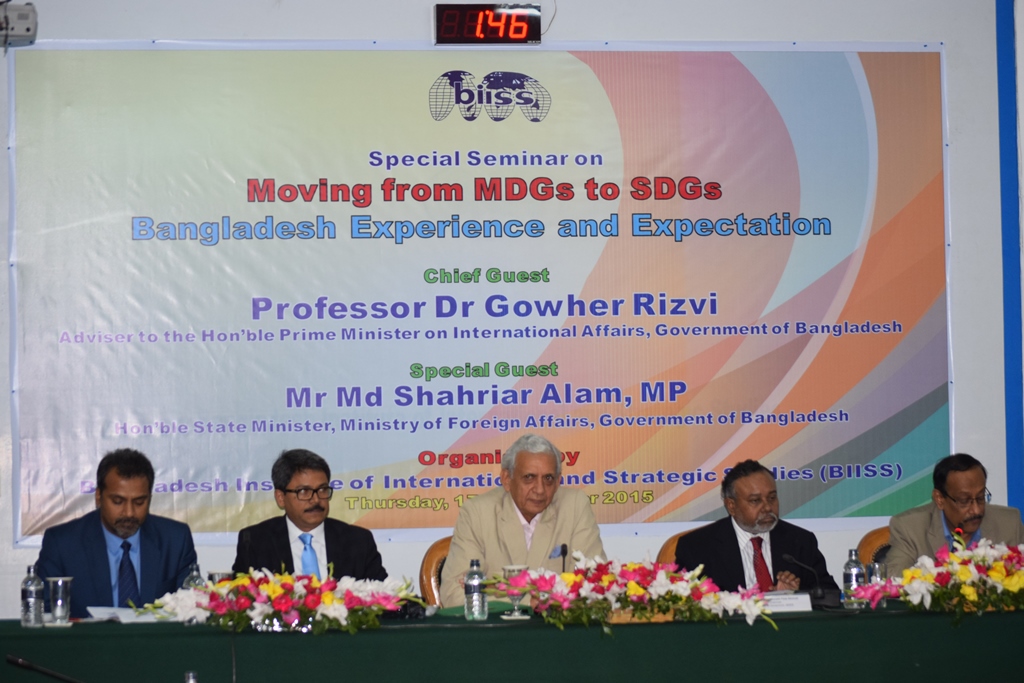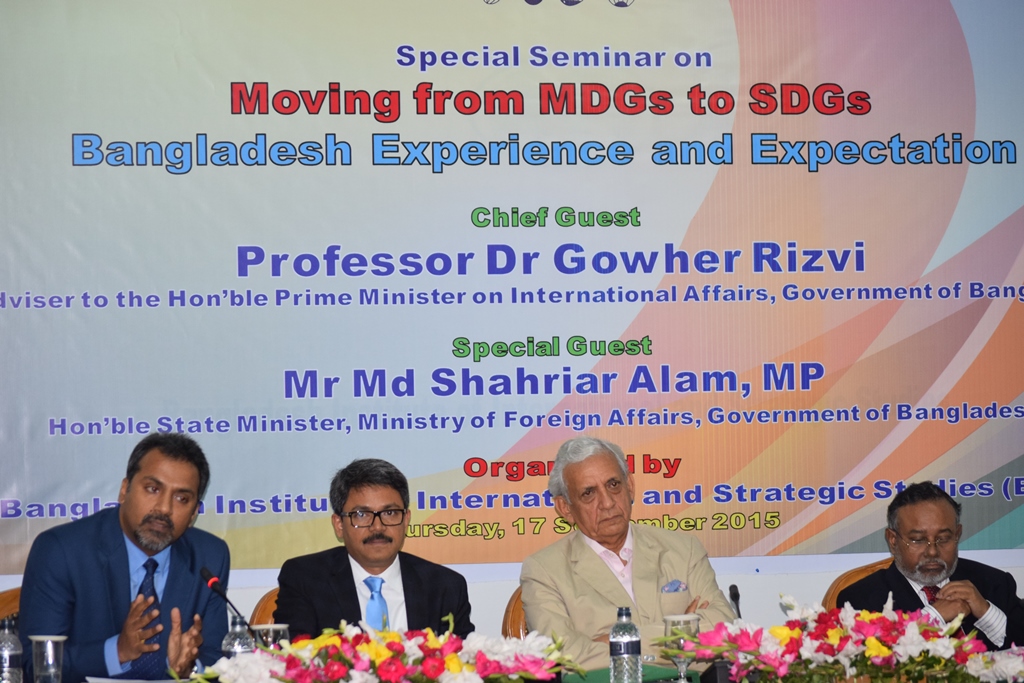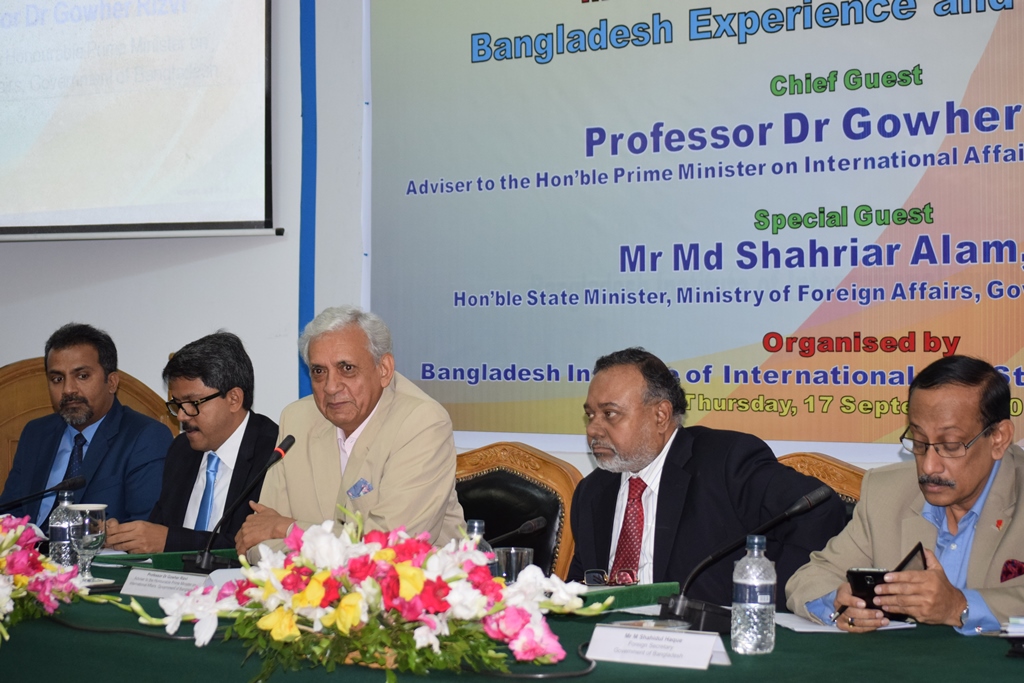Seminar titled Moving from MDGs to SDGs : Bangladesh Experience and Expectation on 17 September 2015
DATE: 2015-09-17
Bangladesh Institute of International and Strategic Studies (BIISS) organised an special seminar titled Moving from MDGs to SDGs: Bangladesh Experience and Expectation on 17th September 2015 to commemorate the 41st anniversary of Bangladesh’s accession into the UN and provide inputs for use at the exchange of views event titled “MDGs to SDGs: A Way Forward” to be hosted by the Bangladesh delegation to the 70th UNGA session on 29 September 2015 in New York. Honourable Prime Minister Sheikh Hasina will be the Chief Guest in the event, expected to be attended by the UN Secretary General as well as other high profile leaders and dignitaries from different countries. Mr Abul Hassan Mahmood Ali, MP, Foreign Minister, Government of Bangladesh was the Chief Guest of the session. Subsequently, two working sessions covered thematic and sectoral issues regarding the successes of MDGs in Bangladesh and drawing lessons for a meaningful transition to SDGs. Professional and eminent sector experts provided their analytical inputs in these sessions. The seminar was concluded with a closing session where Professor Dr Gowher Rizvi, Adviser to the Honourable Prime Minister on International Affairs, Government of Bangladesh was the Chief Guest and Mr Md Shahriar Alam, MP, State Minister, Ministry of Foreign Affairs, Government of Bangladesh was the special guest. A wide range of invited guests were present and took active part in the seminar including Ambassador of the Delegation of the European Union to Bangladesh, Ambassador of the Russian Federation, few other senior diplomats and signatories, scholars, higher government officials, business representatives, NGO and development activists, and media professionals.
OPENING SESSION
In his Opening Address, Major General A K M Abdur Rahman, ndc, psc, Director General, BIISS, said that MDGs are going to end this year. Bangladesh has already met several targets of the MDGs. The country’s huge success on fulfilling different goals of MDGs has also been recognised by the international organisations and the country has received UN award for this attainment. As, the framework of MDGs is on the verge of its time period, world leaders are now negotiating on a more comprehensive framework of development known as SDGs, incorporating three strands of sustainability namely social, economic and environmental.
Mr Abul Hassan Mahmood Ali, MP, Honourable Foreign Minister, Government of Bangladesh, while delivering speech as the Chief Guest of the Inaugural Session, noted the MDGs were the first ever global blueprint for fighting poverty on such scale. When the Millennium Declaration was adopted in September 2000, no one perhaps had any illusion that it would manage to solve all the world’s problems. Yet, the MDGs have given the hope that it is within the existing means to create a new world. The 2030 agenda contains a fairly large portfolio of issues where each country should find some issues of its core interest.
In summing up the opening session, the Chair, Ambassador Munshi Faiz Ahmad, Chairman, Board of Governors of BIISS, said that Bangladesh is among the top achievers in terms of the MDGs. Bangladesh has been at the forefront of the SDGs dialogues since inception. As one of the top performing countries of MDGs, it now looks equally confident to embrace the SDGs. Like the MDGs, the SDGs are also set towards international development.
Dr Mahfuz Kabir, Senior Research Fellow, BIISS, in his presentation titled, “Bangladesh’s Experience with MDGs” said that Bangladesh’s MDGs Progress Report 2015 basically represents the nominal experiences of Bangladesh in achieving MDGs. In terms of cardinal measures, the country achieved a lot because back in 2000 it was unimaginable for Bangladesh to achieve the goals. The goals are very easy to understand for all sections of the society including the policymakers and the activists in different parts of the world. So, what are the experiences for Bangladesh? So far, the experience is comfortable for different stakeholders in Bangladesh. Now it is the time to say Good bye to MDGs but there is a question that is it the death of MDGs. Nevertheless, the successes of MDGs should be transmitted to attain the goals of SDGs.
Professor Dr Mustafizur Rahman, Executive Director, CPD, presented on Learning from the MDGs and Lessons for the SDGs and said this is very timely to think of MDGs and SDGs. SDG is not the death of MDGs rather it is the continuum of MDGs to finish the unfinished targets of MDGs. But, SDGs have been more inclusive because the governments from South have been included in the discourse. The agenda of SDGs is Inclusive, transformative, integrated and universal. An important issue with respect to SDGs is how their implementation will be financed. Improvement in governance, devolution of power, and empowerment of the people can help implement the unfinished agenda of MDGs and also the new commitments that will be taking for the next 15 years.
Dr Binayak Sen, Research Director, Bangladesh Institute of Development Studies, in his presentation titled, “Education and Health: Perspectives from Income Inequality” said that without addressing the concern of income inequality, Bangladesh cannot achieve the unfinished task of MDGs. It was shown that it is possible not to wait for economic growth to do the trade but even at a lower level of income address the avoidable health and educational inequality. The SDGs include the second generation challenges of MDGs like quantity to quality shift, social growth ingredient, and thinking horizontal as well as vertical inequality.
Dr Qazi Kholiquzzaman Ahmad, Chairman, PKSF, presented on “Eradicating Poverty, Inclusive Growth and Graduation to Middle-Income Country”. The presenter said that globally, during the MDG period, poverty was defined on the basis of PPP which was US$1 or Tk.22 a day. Now, the definition of poverty line on the basis of PPP is US$1.25 or Tk.36 a day. Unfortunately, this definition does not capture the whole scenario of actual poverty because of its multidimensional nature. In case of inclusiveness, everybody has to be included according to the SGDs. Another important thing is, Bangladesh is maintaining 6 per cent plus average growth for the last seven to eight years which is very good. About disparity, it can be said that globally there exists extreme disparity. Climate change is also creating some problem. Bangladesh has recently achieved the status of lower middle income country. However, graduation from LDC to middle income country can create some new challenges for the country.
Professor Dr Niaz Ahmed Khan, Department of Development Studies, University of Dhaka, in his presentation titled, “Access to Resources, Environment and Climate Change” stated that MDGs definitive focus on environment has been somewhat limited and myopic. Only the goal seven of MDG constituted a starting point for a development agenda focusing on environmental sustainability. However, it did not address some of the rapidly emerging priority issues of climate change or disaster risk management. Building of SDGs conceptual framework, people, partnership, planet, peace and prosperity will work as five basic pillars under three thematic areas namely – equity, human rights and sustainability.
Mr M Shahidul Haque, Foreign Secretary, Government of Bangladesh, summed up the working sessions and said it is very difficult to characterise the very rich issues of this discussion. The honourable Foreign Minister made the opening statement where he highlighted the features from our MDG experience like how political will shape into decisions, action plan, ownership, working with domestic resources. The seminar covered series of issues clustering around all the seven MDGs goals, and strongly looked at education and health.
In the Concluding Session, Dr N Paraneithara, WHO Representative to Bangladesh, the Guest of Honour said that Bangladesh has performed very well on MDG. Bangladesh started working on MDGs well before in early-2000s. However, there is a caveat that the SDGs would be challenging task to attain. However, the Bangladesh government is committed to incorporate the national planning with the international standard. The Bangladesh team has performed wonderfully in the SDG negotiating process. Bangladesh could be the model of development even in the SDGs. The United Nations continued to be a trusted partner of the Government of Bangladesh and looks forward to the next stage of this partnership on SDGs.
Special Guest of the Concluding Session, Honourable State Minister, Mr Md Shahriar Alam, MP, Ministry of Foreign Affairs, Government of the People’s Republic of Bangladesh noted that the issue has considerable significance for Bangladesh. It is very timely as the deadline for the attainment of MDGs is nearing and the new development agenda for the next 15 years is all agreed and about to be launched. Bangladesh is a forerunner in achieving the MDGs. Under the leadership of the Prime Minister Sheikh Hasina, the country has made significant progress. Now Bangladesh needs to look forward and best prepare for the journey of reaching SDGs which are more ambitious.
Professor Dr Gowher Rizvi, Adviser to the Honourable Prime Minister on International Affairs, Government of Bangladesh delivered his speech as Chief Guest of the concluding session and said Bangladesh is in a really good position. The Prime Minister Sheikh Hasina will be in New York in a few days to launch the SDGs. She was also in there where the MDGs were launched. Although Bangladesh is proud of MDGs, there is lot of things that developing countries must do like what are their obligations and how these will be measured. If Bangladesh is going to make sustainable development goals successful, there will be a strong need to have a greater and equal partnership despite partners being unequal.

